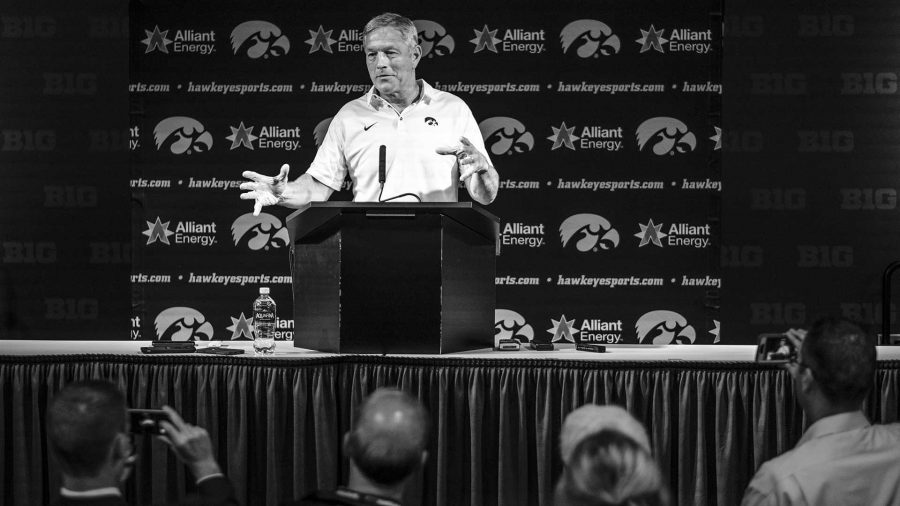A recent Opinions column argued Kirk Ferentz failed to take a stand, but Ferentz did the exact opposite.
Kirk Ferentz, when asked Sept. 26 whether he would support any of his players should they choose to use the national anthem to protest police brutality and all other consequences of institutional racism, answered, in a number of words, no.
Courtney Baumann’s Opinions piece on Ferentz’s comments surrounding the topic was, while well intentioned, still ignored the most important part of this entire story, which is that in all of this, University of Iowa employee(s) are using their position(s) to entrench the legacy of white supremacy in America by suggesting that black
athletes should somehow have to sacrifice their right to free speech and expression when they hit the field.
“This is the one time we put everything aside. We all dress alike, act alike, and we’re trying to do the same thing,” Ferentz said on Sept. 26. This language is drenched in the history of racism and sport in America; which is ironic, as Ferentz was somehow trying to convey that sport has been an arena of inclusion historically. The truth is that historically, black athletes have been forced to surrender their identities, their passion, and (most importantly) their desire for meaningful change in the name of being able to compete.
“I read this this morning that sports and politics are intertwined. I see the world a lot differently, I guess,” Ferentz said. To put it differently; you’re here to play football and ONLY to play football.
RELATED: Baumann: Ferentz didn’t take a stand when he should have
Ferentz went on to suggest that racism was an issue akin to say, cancer, and that if athletes wanted to make a difference they should “use a platform where it makes a difference,” such as voting or community activism. Let us not lose the gravity of these statements. This is the opinion of a high-level athletics official at the UI — the highest paid state employee in Iowa — and it suggests one of two things:
1) That the Athletics Department and UI truly don’t believe football is an appropriate platform to promote narratives of change, or,
2) They don’t believe police brutality and the condition of black life in America are issues that need changing.
It is obvious, though, that the Athletics Department and the university use the football program as a platform to convey messages about politics and society: from farmers to breast cancer, the Children’s Hospital and even your local public-service heroes (Nebraska Heroes game), there are plenty of causes that the Athletics Department deems worthy enough of dedicating time and resources toward recognizing and advancing. Black Lives Matter is simply not one of them.
And neither are any movements, gestures, or behaviors that would suggest that racism is a problem killing black people and needs to be addressed.
It is not that Ferentz, the Athletics Department, and the university community find themselves on the wrong side of history or politics but rather that they all guarantee Black Lives will continue to not Matter.
Baumann said Ferentz failed to take a stand. I would argue that he very clearly did.
— Matthew Bruce
UI student



